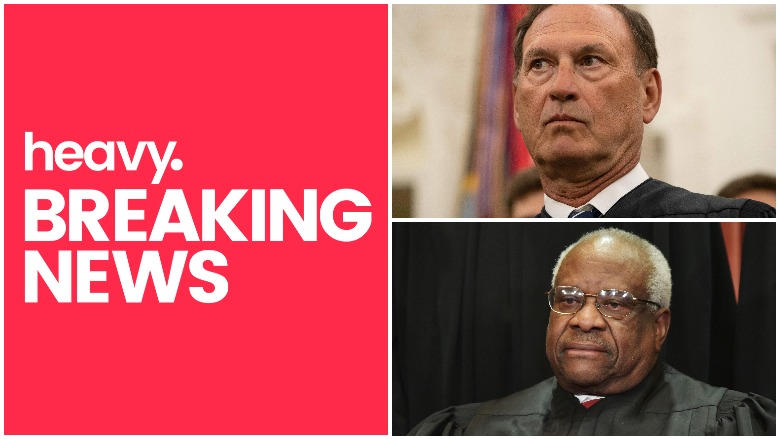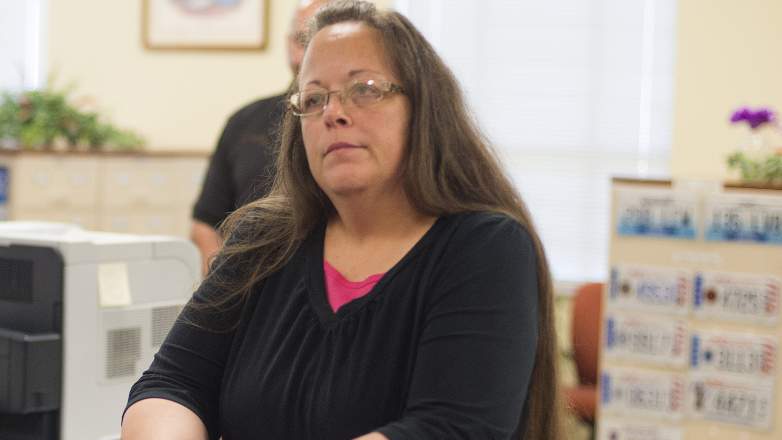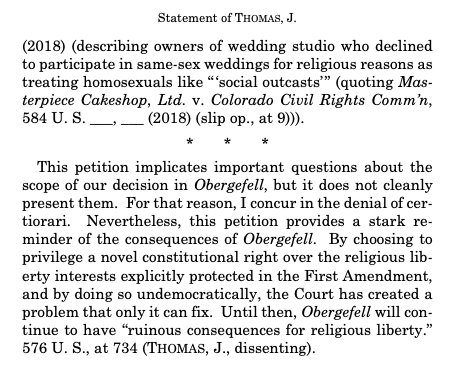
In a Monday, October 5 Supreme Court decision, Justices Clarence Thomas and Samuel Alito signaled that they believed the court should at some point revisit the decision that made same-sex marriage the law of the land, because it infringes on the First Amendment.
The court declined to hear the case of Kim Davis, the Kentucky county clerk who refused to issue marriage licenses to same-sex couples, The Washington Post reported.
Thomas and Alito wrote in a response, however, that Davis was a “victim” of the court’s 2015 Obergefell decision finding that same-sex marriage is guaranteed under the 14th Amendment. Claiming the decision took a “cavalier” treatment of religion, they suggested the court may have to “fix” problems created by the decision.
With Judge Amy Coney Barrett, President Donald Trump’s conservative nominee to fill the late Justice Ruth Bader Ginsburg’s seat, likely to be confirmed, many liberals and progressives expressed fear about the future of same-sex marriage in America on Monday.
Here’s what you need to know:
The Court Refused to Hear Davis’ Case Looking to Block a Lawsuit Against Her, but Thomas & Alito Made It Clear They Believe Gay Marriage Should Be Revisited or Overturned
Davis was appealing a lower court decision to allow a lawsuit against her based on her conduct as clerk to proceed. The court declined to hear her appeal, but Thomas and Alito wrote an eyebrow-raising statement along with the denial, signaling they see big problems with the Obergefell decision enshrining the right to gay marriage.
You can read their whole statement here, via the Supreme Court.
Thomas and Alito decried the decision as finding the right to same-sex marriage in the 14th Amendment, “even though that right is found nowhere in the text.” Further, the justices wrote, the decision is a threat to some Americans’ religious liberty, and if the decision were left up to individual states, those religious liberties could have been respected.

Rowan County, Kentucky, clerk Kim Davis. (Getty)
Thomas and Alito also said language in the majority opinion suggested that people with religious objections to same-sex marriage had a “bigoted worldview.”
Their statement added:
“Kentucky law that would protect the free exercise rights of those who had religious objections to same-sex marriage. But those efforts were cut short by this Court’s decision in Obergefell. As a result of this Court’s alteration of the constitution, Davis found herself faced with a choice between her religious beliefs and her job. When she chose to follow her faith, and without any statutory protection of her religious beliefs, she was sued almost immediately for violating the constitutional rights of same-sex couples.
Davis may have been one of the first victims of this Court’s cavalier treatment of religion in its Obergefell decision, but she will not be the last. Due to Obergefell, those with sincerely held religious beliefs concerning marriage will find it increasingly difficult to participate in society without running afoul of Obergefell and its effect on other antidiscrimination laws. It would be one thing if recognition for same-sex marriage had been debated and adopted through the democratic process, with the people deciding not to provide statutory protections for religious liberty under state law. But it is quite another when the Court forces that choice upon society through its creation of atextual constitutional rights and its ungenerous interpretation of the Free Exercise Clause, leaving those with religious objections in the lurch.
Thomas and Alito concluded by saying that the same-sex marriage decision “created a problem only [the court] can fix,” suggesting the decision either needs to be overturned or exceptions need to be enshrined in federal law.
The Statement Sounded Alarm Bells for Many Liberals Concerned Amy Coney Barrett’s Confirmation Could Spell the End for Same-Sex Marriage Rights
Chasten Buttigieg, husband of former South Bend, Indiana, mayor and Democratic presidential candidate Pete Buttigieg, took notice of the decision and warned people who care about same-sex marriage rights to vote accordingly.
“Just a reminder that overturning [gay marriage] is in the Republican Party’s official platform,” he said. “Alito and Thomas just signaled their wishes to overturn it and we already know where Barrett stands on the issue. Please vote.”
Los Angeles City Councilman David Ryu also sounded alarm bells about Thomas and Alito’s statement.
“Two [Supreme Court] justices are now calling to overturn marriage equality,” he said. “A conservative court will turn back decades of progress if they get the chance. We must not give them that chance.”
Michigan Law School Assistant Professor Leah Lipman took notice of Thomas and Alito’s statement and wryly added, “Happy first Monday of October and start of the new [Supreme Court] term, everybody!”
CNN legal analyst Steve Vladeck called the statement “ominous” and said it was clear some justices view same-sex marriage as an “affront” of religious liberty.
“Especially at this moment in time, with major religious liberty cases already in the pipeline and in the middle of a contentious confirmation fight, the result of which could move the court sharply to the right on these issues, it’s a telling — and ominous — message for the court’s two longest-serving conservatives to send,” he said.
Amy Coney Barrett Has Said Her Faith Would Not Influence Her Rulings, But She Is Associated With an Anti-LGBT Group

GettySeventh U.S. Circuit Court Judge Amy Coney Barrett speaks after U.S. President Donald Trump announced that she will be his nominee to the Supreme Court in the Rose Garden at the White House September 26, 2020 in Washington, DC.
Barrett has said that her religious convictions “would never impose my own personal convictions upon the law,” during her 2017 confirmation hearings to serve on the 7th Circuit Court, The Washington Post reported.
However, at that same hearing, her links to the controversial religious legal advocacy group Alliance Defending Freedom, for which she has given five paid speeches, according to the Post report.
The Southern Poverty Law Center has designated the ADF a hate group which discriminates against LGBTQ people. According to the SPLC, the group supports criminalization of sex acts between LGBTQ adults in the United States and abroad, and has also defended the sterilization of trans people in other nations.
On its website, the ADF describes itself as “an alliance-building, non-profit legal organization that advocates for the right of people to freely live out their faith.”
As of Monday, Senate Republicans still planned to hold an in-person vote in the near future on Barrett’s confirmation, despite a slew of GOP lawmakers and people in Trump’s orbit testing positive for coronavirus following the White House Rose Garden announcement of Barrett’s nomination last month.
Senator Tom Cotton told Fox News Monday that Republicans would vote on Barrett even if some of them have to be “wheeled in,” Mediaite reported.
READ NEXT: Trump’s ‘Space Force’ Twitter Spree Sparks Questions Over Dexamethasone ‘Side Effects’



